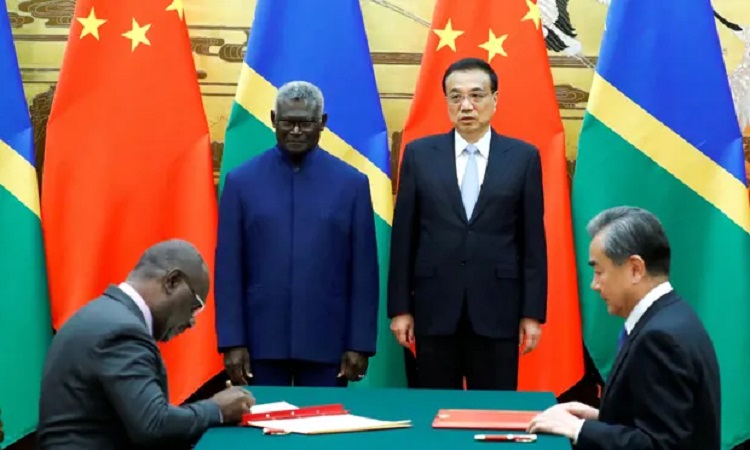A tendency to “securitise” problems via a geopolitical lens only downplays legitimate aspirations of local communities.
By Ilan Kiloe
In his statement delivered during the March 2022 parliament session, Solomon Islands Prime Minister Manasseh Sogavare described the then recently revealed security pact between Solomon Islands and China as an effort to broaden and diversify security arrangements to respond to needs of the country.
National security challenges, particularly the 2021 riots, had highlighted the limitation of local police to respond to law-and-order situations in the country. These events had made the diversification of security arrangements in Solomon Islands a necessity.
The Sogavare government’s foreign policy “friends to all, enemy to none” provided the rationale behind the decision to pursue the security pact with China.
As a country that had recently recovered from the disruptive ethnic tension that occurred from 1998–2003 and riots, it is expected that government’s focus would naturally be on economic recovery and state building rather than on the geopolitical rivalry between China and the United States and its Indo-Pacific allies.
In fact, for ordinary Melanesians, the geopolitical competition between the US and China is not significant. As eloquently stated by regional analyst Patrick Kaiku:[For] communities across the region, geopolitical rivalry does not register as important. Melanesian states are otherwise preoccupied, mostly with domestic nation-building efforts and development priorities.
These sentiments are in line with a conclusion reached in 2000 by Professor Ron Crocombe in his research commission by the Forum Regional Security Committee (FRSC), where he concluded that for Pacific Islands countries, internal security threats are the most serious while external military threats exist but are very low.
Notwithstanding this, the United States and its Indo-Pacific allies considered the Solomons-China security pact as a threat to peace given China’s ambition for global influence. To this end, the pact was considered as a security problem as it may enable China to build its military presence in the region. Views were also expressed about the perceived goal by China to replace the United States as the pre-eminent power in the Pacific region.
Consequently, such perspectives attracted disproportionate attention all over the world. Mainstream media, social media platforms, as well as ongoing political and academic debate, all played a role in the securitisation of the Solomons-China pact. This was furthered in 2022 after NATO had declared the rise of China has serious consequences in the Indo-Pacific region.
The downside of the securitisation process is that it may be potentially hazardous in the region because it will warrant and legitimise extraordinary means of intervention, including the possibility for military intervention. Such action may eventually undermine established democratic processes and be counterproductive to peace and security.
The geopolitical competition will serve the region well if it is geared towards the development of partnerships that aims to address the security needs of the region.
Instead, if the countries focus their attention on the security needs of Solomon Islands, and the wider region for that matter, and formulate strategies to address them, they may be able to achieve the right balance to advance collective interests.
The geopolitical competition will serve the region well if it is geared towards the development of partnerships that aims to address the security needs of the region.
Sogavare’s statement was indicative of the inadequacy of the current security assistance and approaches in the region. There is still need for diversification of the security arrangements and approaches. The re-occurring law and order challenges in the country have from time to time exposed the policing needs. Appropriate training and equipment are still required to enable local police to effectively address the security needs. The security pact with China was therefore considered as an opportunity for upskilling, building capacity as part of the government’s effort to diversify security approaches.
Any form of security intervention and assistance to Solomon Island hence should not only focus on the restoration of law and order but should also focus on institutional and capacity building of the security sector. In the process, public confidence in the local police and their ability to be able to respond to security needs in the country can be restored and maintained.
Nevertheless, the approach by the United States and allies has brought about positive gains for the country. High-level US government officials have visited Solomon Islands and reopened a permanent mission in the country.
This followed promises of aid to combat climate change and other development needs of the country.
Like Solomon Islands, other Melanesian countries face similar security challenges. While climate change was identified as the single greatest security threat in the Pacific region, Melanesian countries face unique security challenges ranging from armed violence, land disputes, population growth, youth unemployment, and security challenges relating to the extraction industry.
To address security challenges peculiar to Melanesian countries, sub-regional organisation such as the Melanesian Spearhead Group (MSG) play an important role in developing strategies and common positions to present its members interests in the ongoing geopolitical competition in the region.
As noted during a contribution to a recent panel discussion on “Security goals in Melanesia and Motivations behind the Geostrategic Changes in the Pacific” organised by the National Bureau of Research (NBR), the role of the MSG to coordinate collective security responses for Melanesian countries is becoming more important than ever.
SOURCE: DEVPOLICY.ORG/PACNEWS















